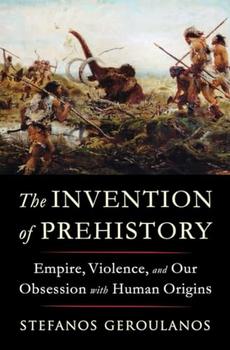
Empire, Violence, and Our Obsession with Human Origins
by Stefanos Geroulanos
An eminent historian tells the story of how we came to obsess over the origins of humanity—and how, for three centuries, ideas of prehistory have been used to justify devastating violence against others.
Books about the origins of humanity dominate bestseller lists, while national newspapers present breathless accounts of new archaeological findings and speculate about what those findings tell us about our earliest ancestors. We are obsessed with prehistory—and, in this respect, our current era is no different from any other in the last three hundred years. In this coruscating work, acclaimed historian Stefanos Geroulanos demonstrates how claims about the earliest humans not only shaped Western intellectual culture, but gave rise to our modern world.
The very idea that there was a human past before recorded history only emerged with the Enlightenment, when European thinkers began to reject faith-based notions of humanity and history in favor of supposedly more empirical ideas about the world. From the "state of nature" and Romantic notions of virtuous German barbarians to theories about Neanderthals, killer apes, and a matriarchal paradise where women ruled, Geroulanos captures the sheer variety and strangeness of the ideas that animated many of the major thinkers of the eighteenth and nineteenth centuries, including Jean-Jacques Rousseau, Charles Darwin, and Karl Marx. Yet as Geroulanos shows, such ideas became, for the most part, the ideological foundations of repressive regimes and globe-spanning empires. Deeming other peoples "savages" allowed for guilt-free violence against them; notions of "killer apes" who were our evolutionary predecessors made war seem natural. The emergence of modern science only accelerated the West's imperialism. The Nazi obsession with race was rooted in archaeological claims about prehistoric IndoGermans; the idea that colonialized peoples could be "bombed back to the Stone Age" was made possible by the technology of flight and the anthropological idea that civilization advanced in stages.
As Geroulanos argues, accounts of prehistory tell us more about the moment when they are proposed than about the deep past—and if we hope to start improving our future, we would be better off setting aside the search for how it all started. A necessary, timely, indelible account of how the quest for understanding the origins of humanity became the handmaiden of war and empire, The Invention of Prehistory will forever change how we think about the deep past.
"An incisive and captivating reassessment of prehistory ... In lucid prose, Geroulanos unspools an enthralling and detailed history of the development of modern natural science. It's a must-read."
―Publishers Weekly (starred review)
"Stunningly comprehensive... The author clearly shows how Eurocentric standards still prevail in how we organize history, and he concentrates much of his prodigious research on the power of language in determining our "epic myths"―e.g., the use of the term primitive in characterizing Indigenous peoples and thus justifying exploitation and extermination.... Consistently illuminating... Geroulanos effectively exposes how little separates modern humans from the idea of the 'barbarian.' An astute, powerfully rendered history of humanity."
―Kirkus Reviews (starred review)
"In this remarkable and enlivening study, Stefanos Geroulanos traces the development of our modern fascination with humanity's deep past, and lays out that fascination's deadly costs."
―Amia Srinivasan, author of The Right to Sex: Feminism in the Twenty-First Century
"Stefanos Geroulanos reveals how the quest for human origins emerged from the imperial mandate―to possess the earth and control its peoples. His subtle, passionate book steers us away from an unreal past and toward an equal, peaceful, and sustainable future for all."
―Merve Emre, author of The Personality Brokers: The Strange History of Myers-Briggs and the Birth of Personality Testing
"In a brilliant masterstroke, Stefanos Geroulanos turns the tables on those shining a lamp on human origins, documenting how they have always held up a mirror to themselves and their own times... . [T]his magnificent book reminds us that inquiry is always political―and that the continuing fashion of exploring the birth of civilization and the dawn of everything has the darkest roots."
―Samuel Moyn, author of Humane: How the United States Abandoned Peace and Reinvented War
This information about The Invention of Prehistory was first featured
in "The BookBrowse Review" - BookBrowse's membership magazine, and in our weekly "Publishing This Week" newsletter. Publication information is for the USA, and (unless stated otherwise) represents the first print edition. The reviews are necessarily limited to those that were available to us ahead of publication. If you are the publisher or author and feel that they do not properly reflect the range of media opinion now available, send us a message with the mainstream reviews that you would like to see added.
Any "Author Information" displayed below reflects the author's biography at the time this particular book was published.
Stefanos Geroulanos is the Director of the Remarque Institute and a Professor of History at New York University. The author of Transparency in Postwar France: A Critical History of the Present and other books, he lives in New York, NY.
Your guide toexceptional books
BookBrowse seeks out and recommends the best in contemporary fiction and nonfiction—books that not only engage and entertain but also deepen our understanding of ourselves and the world around us.